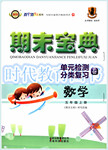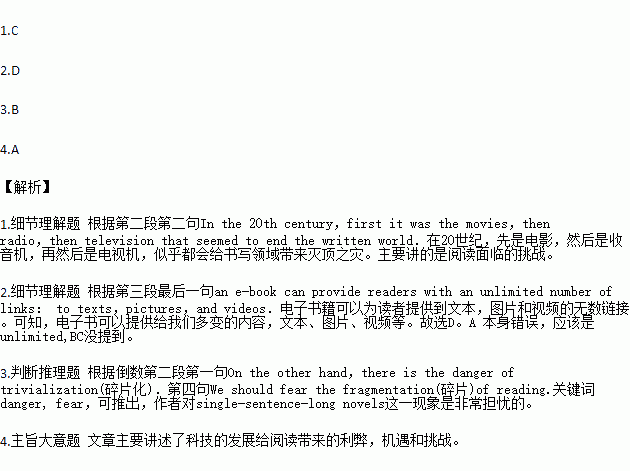题目内容
C
A crisis is on the way.Global warming? The world economy? No,the decline of reading.People are just not doing it anymore,especially the young.Who’s responsible? What is responsible? The Internet,of course,and everything that comes with it—Facebook,Twitter,etc..
There’s been a warning about the coming death of literate civilization for a long time.In the 20th century,first it was the movies,then radio,then television that seemed to end the written world.None did.Reading survived;in fact it not only survived,it has developed better.The world is more literate than ever before — there are more and more readers.and more and more books.
The fact that we often get our reading material online today is not something we should worry over.The electronic and digital revolution of the last two decades has arguably shown the way forward for reading and for writing.Interconnectivity allows for the possibility of a reading experience that was barely imaginable before.Where traditional books had to make do with photographs and illustrations,an e-book can provide readers with an unlimited number of links:to texts,pictures,and videos.
On the other hand,there is the danger of trivialization(碎片化).One Twitter group is offering its followers single-sentence-long“digests”of the great novels.War and Peace in a sentence? You must be joking.We should fear the fragmentation(碎片)of reading.There is the danger that the high-speed connectivity of the Internet will reduce our attention span—that we will be incapable of reading anything of length or which requires deep concentration.
In such a fast-changing world,in which reality seems to be remade each day,we need the ability to focus and understand what is happening to us.This has always been the function of literature and we should be careful not to let it disappear.Our society needs to be able to imagine the possibility of someone entirely in pace with modern technology but able to make sense of a dynamic,confusing world.
1.In Paragraph 2,we can learn .
A.the disappearance of traditional books
B.the development of human civilization
C.the historical challenges for reading
D.the birth of pioneering e-books
2.According to the passage,the advantage of e-books is .
A.1imited link
B.imaginative design
C.low cost
D.varied contents
3.How does the author feel towards single-sentence-long novels?
A.Doubtful B.Worried
C.Shocked D.Hopeful
4.What is the main idea of the passage?
A.Technology is an opportunity and a challenge for traditional reading.
B.Technology pushes the way forward for reading and writing.
C.Interconnectivity is a feature of new reading experience.
D.Technology offers a greater variety of reading practice.
 期末宝典单元检测分类复习卷系列答案
期末宝典单元检测分类复习卷系列答案
